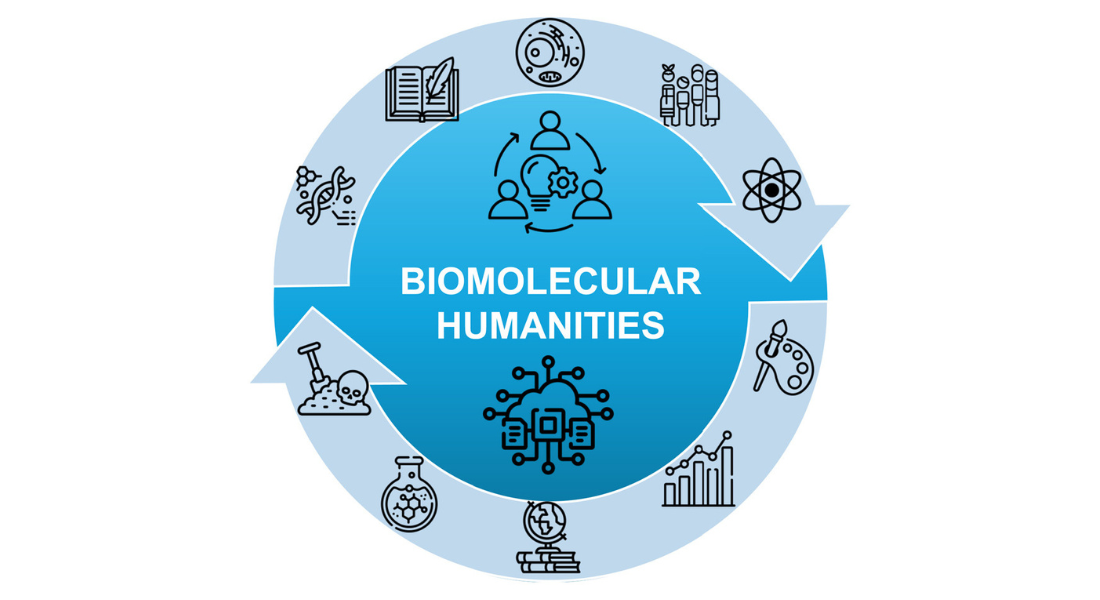Genetic and Biomolecular History – Bridging Sciences and Humanities
School of Archaeology talk by Professor Jerome de Groot, Manchester University. The talk will be followed by a panel discussion.
Jerome de Groot is Professor of English, American Studies and Creative Writing at the University of Manchester and Director of AHRC North West Consortium.
Panel: Jerome De Groot, Ester Oras, Frederik Valeur Seersholm, Laura Cristina Viñas Caron, Rune Iversen
Moderator: Matthew Collins
The timing for this discussion could not be more pertinent. With the Wellcome Trust recently highlighting the immense potential for innovation at the nexus of genomics, humanities, and social sciences, this conversation is positioned at the forefront of a significant shift in interdisciplinary research. This initiative highlights the need for innovative collaborative models that transcend traditional boundaries to drive transformative breakthroughs—a theme central to our panel.
Programme
- Welcome and introduction by Professor Matthew Collins
- Talk by Professor Jerome de Groot
- Panel discussion on Biomolecular Humanities - How can different approaches such as biomolecular archaeology, studies of identity and ancient DNA and material culture perspectives inform each other across the humanities-sciences divide?
- Q&A
You are welcome to stay for a drink after the event!
What, then, is an historian? In my work I look at multiple ‘new’ ways of approaching the past, thinking about evidence, ethics, the translation of information, and the construction narratives to rethink what we consider ‘historical’ work to be. Can we understand the reading of genetic material to be historical practice of a kind? In Bernadine Evaristo’s novel Girl, Woman, Other (2021) the racist character Penelope uses a DNA test and the results challenge her sense of self and of her past: ‘this was the science that was the deepest, most secret part of herself, and there was a collision between who she thought she might be and who she apparently was’ (p. 446). How does Penelope’s investigation of her own past change because of the intervention of this ‘deepest’ science?
Who, then, is an historian? The paleogeneticist Svante Pääbo was awarded the Nobel Prize for Medicine in 2022. In acceptance he argued that: 'the information extracted from ancient genomes contributes to our understanding of the evolution and history of humans and many other organisms’. Pääbo’s understanding of the past as something that might be changed through new scientific innovation suggests that genetic data might be influential and important in rethinking the human past, both in terms of what that past might mean but also how that past might be translated into the contemporary moment. What do Pääbo’s thoughts about the nature of history mean for the practice of history, the work of history, the status of the historian?
These Genetic and Biomolecular histories are not singular or even particularly unusual in their re-rendering of historical agency, understanding, and configuration of knowledge. For our purposes, however, Genetic and Biomolecular approaches allow us to approach what might be considered ‘standard’ historical ideas – ethics, evidence, data, argument, archive, narrative – with new insight, and in doing so open wider discussions about what historical practice even is. This talk is intended to provoke new thinking about the nature of the discipline of history and the ways that it might be resourced. It is also a way of reworking and reconfiguring our understanding of what historical ‘knowledge’ is and what we do with it.
iScience, Volume 28, Issue 2, 21 February 2025, 111679
The “biomolecular humanities”? New challenges and perspectives
Ester Oras, Jerome de Groot, Ulrika Björkstén
Map of South Campus
View directions.
View on map of the Faculty of Humanities - South Campus.
View map of South Campus (pdf).

